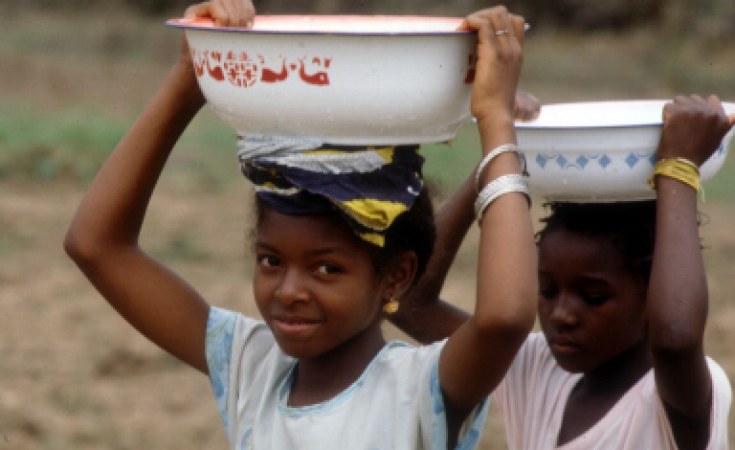No innovation in the past 200 years has done more to save lives and improve health than the sanitation revolution triggered by the invention of the toilet.
The little-known fact was stated by Sylvia Mathews Burwell, president of the Bill & Melinda Gates Foundation's Global Development Program, in her keynote address to the third annual AfricaSan conference in Kigali, Rwanda, on Tuesday.
But, she said, the innovation did not go far enough. "It only reached one-third of the world. What we need are new approaches. New ideas. In short, we need to reinvent the toilet," Burwell said.
She exhorted donors, governments, the private sector and NGOs at the gathering organized by the African Ministers' Council on Water to support the foundation's new strategy. She argued that flush toilets are unavailable to most of the world's poor, with more than a billion people forced to defecate in the open.
Burwell emphasized the link between unhygienic water and sanitation practices and the estimated 1.5 million children who die annually from preventable diarrheal diseases. She cited a statistic noted by the chair of the United Nations Secretary-General's Advisory Board on Water and Sanitation, Prince Willem-Alexander of the Netherlands: "Disease caused by unsafe sanitation accounts for roughly half of all hospitalizations in the developing world."
The Gates Foundation used the opportunity of its participation in AfricaSan to announce U.S.$41.5 million in new grants aimed at encouraging innovative approaches to the storage and re-use of human waste, as well as water use. The initiative was applauded by many key role-players in sanitation on the continent that may stand to gain most from this radical new approach.
"Across Africa, improved sanitation is an essential human need that we must take action to address," said Mamadou Dia, president of the African Water Association. "We welcome efforts to focus new attention, ideas and resources on this important issue."
AfricaSan delegate Teddy Gounden travelled to Rwanda from the country where the first two conferences were held, South Africa. He works as manager for Education and Capacity Development for the city of Durban's eThewkini Water and Sanitation department.
"We are very positive about the sustainable aspect of the Gates Foundation's work in water and sanitation," said Gounden. "They really think out of the box and that's what makes them different: they're prepared to put money into new ideas, no matter how radical or even impossible they might seem. That's what's so exciting for us in Durban."
A key partner of the foundation is the U.S. Agency for International Development (USAID). In a collaboration with each providing $8.5 million, WaSH for Life has been launched, a four-year program to "help scale up evidence-based approaches to delivering water, sanitation and hygiene services to the poor".
The foundation's new strategic approach includes various programs specifically aimed at Africa's urban poor. A $12 million grant will back "municipal-supported unsewered sanitation" pilot projects in sub-Saharan Africa through the African Development Bank's African Water Facility, with a potential focus on faecal sludge management services. A joint initiative co-funded by the foundation and the Kenyan and German governments will be implemented by the Kenya Water Services Trust Fund and Germany's Agency for International Cooperation (GIZ) to provide $10 million to scale up sanitation in Kenya's low-income urban areas.
"Reinventing the Toilet" is a key part of the Gates Foundation's effort to innovate in the area of sanitation. This $3 million grant goes to eight universities to develop an easily installable toilet that doesn't rely on water, a sewer connection or power, at a usage cost of no more than 5 (US) cents per day.
The sole African grantee is the University of KwaZulu-Natal in Durban, South Africa, which is developing both a Urinary Diversion toilet and a recycling system for solid waste which both produce fertilizer for use in sustainable agriculture.
"We aim to stimulate research on sanitation in Africa with this grant," said Frank Rijsberman, director of the Gates Foundation's Water, Sanitation and Hygiene initiative. "It provides money to a network of these eight universities and we believe that they can make a contribution through their research in onsite sanitation."
The foundation's support for university-based study and research into sustainable sanitation continues with an $8 million grant to the UNESCO-IHE Institute for Water Education in sub-Saharan Africa and Southeast Asia. Microsoft founder Bill Gates and his wife, Melinda, aim to transform postgraduate water and sanitation education in part through "a robust online curriculum to reduce costs and increase accessibility to higher education".
The foundation's four African partners are the International Institute for Water and Environmental Engineering, 2IE, in Ouagadougou, Burkina Faso; the Kwame Nkrumah University of Science and Technology (KNUST) in Kumasi, Ghana; Makerere University in Kampal, Uganda; and the University of Cape Town, South Africa.
"The foundation's strategy involves gathering evidence to determine what people want and measuring what really works," Burwell told the AfricaSan conference. "It includes stimulating demand for improved sanitation in both rural and urban communities through education and raising awareness.
It also involves advocacy efforts to engage governments and other public and private partners to prioritize sanitation policies that address this urgent issue."
The Gates Foundation's increased focus on sanitation, through these new grants, bring its overall commitment in this field to $265 million.


